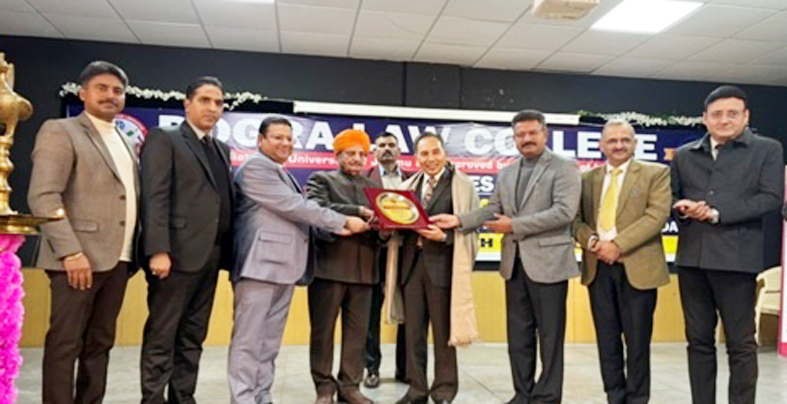JAMMU, Dec 19: Today, Chief Justice Tashi Rabstan of the High Court of J&K and Ladakh, along with his role as Patron-in-Chief of the J&K Legal Services Authority, led an interactive session organized by the J&K Legal Services Authority in collaboration with DLSA Samba and Dogra Law College in Bari Brahmana.
This event aimed to educate and empower law students about their essential function in promoting justice, raising awareness, and tackling significant societal issues. The Chief Justice was joined by M. K. Sharma, Principal Secretary, and Amit Kumar Gupta, Member Secretary of the J&K Legal Services Authority. Present at the event were R. N. Wattal, Principal District & Sessions Judge (Chairman DLSA) Samba, Rajesh Sharma, Deputy Commissioner of Samba, Th. Gulchain Singh Charak, Chairman of the Dogra Education Trust, Sandeep Singh Sen, Secretary of DLSA Samba, along with the Principal and Dean of Dogra Law College and other faculty members.
During her welcoming remarks, Shuchi Sharma stressed the significance of interactive sessions in connecting legal education with its real-world applications. She highlighted the importance of cultivating socially aware and professionally skilled lawyers, asserting that initiatives like this are vital for fostering an in-depth understanding of their responsibilities as future guardians of justice among students.
In his keynote address, the Chief Justice praised the students for their participation and acknowledged their talent showcased through a skit. He remarked, “Initiatives like this, especially from law students, can be pivotal in enhancing awareness among the public, particularly in rural areas, if they engage with the Legal Services Authority to reach out to those in need.” Justice Tashi encouraged students to actively participate in societal transformation.
He directed Legal Services Institutions to involve law students in their activities, including Lok Adalats, so that aspiring legal professionals grasp their role in resolving issues amicably while contributing to an informed citizenry. He urged them to utilize their legal knowledge to promote equality, uphold constitutional values, and ensure access to justice for vulnerable communities.
In a symbolic gesture of growth and commitment to a sustainable future, the Chief Justice planted a sapling on the Dogra Law College campus.
Advocate Rohit Verma, a Panel Lawyer with HCLSC Jammu, gave a powerful presentation that traced the legislative history related to acid attacks. He explained that, following directives from the Apex Court, the IPC was amended to include Sections 326 A & B, which punish perpetrators of acid attacks with severe penalties. He also noted that similar provisions are now included in Sections 124 (1) & (2) of the Bhartiya Nyaya Sanhita (BNS) 2023.
Advocate Verma further emphasized the extensive social and emotional ramifications of acid attacks, describing them as assaults not just on physical health, but on a person’s dignity and identity. He underscored the importance of laws like Section 357C of the CrPC, which guarantees free medical treatment for victims, and the Victim Compensation Scheme, which provides financial relief. He urged students to act as champions of change and elevate awareness to prevent future occurrences of such crimes.
The students of Dogra Law College also presented a poignant skit illustrating various social issues, including dowry demands, domestic violence, pre-natal sex determination, unlawful pregnancy termination, eve-teasing, and the heinous crime of acid attacks. The captivating performances left the audience mesmerized.
Additionally, the NALSA theme song was played, eloquently showcasing the mission, motto, and objectives of Legal Services.
Th. Gulchain Singh Charak, Chairman of the Dogra Education Trust, expressed his gratitude to the Chief Justice for his inspiring address and guidance to the students.
This interactive session was a testament to the commitment of Dogra Law College and the J&K Legal Services Authority in fostering the next generation of legal professionals and empowering them to make meaningful contributions to the justice system.


Leave a Reply